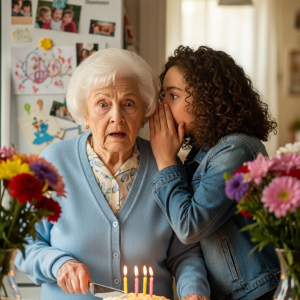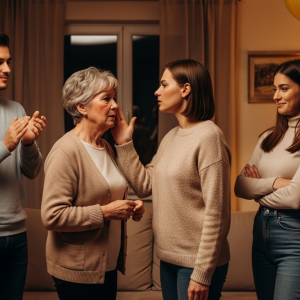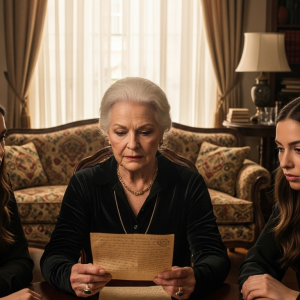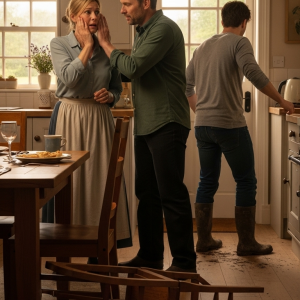It was a plain email. No greeting, no warmth, just a few lines typed beneath Nenah’s signature, sent from her iPhone. The subject line read, “Holiday plans.” I already knew what it would say, but I stared at it for a full minute before opening it.
Not a call from my son, Garrett. Not even a voice memo. Just a flat screen’s glow with a message that felt more like a calendar alert than an invitation. For a woman who once baked three different cakes for his birthday because he couldn’t decide on a flavor, the brevity landed harder than it should have.
The message was brutally simple: Christmas dinner will be at our house again this year around 5. Hope you can come. Not even my name. Just that one word, hope, as if my presence was a casual option, as if I were optional.
It hadn’t come from Garrett. It came from Nenah. That stung more than I would admit. My son and I used to talk every Sunday. Now, I received monthly texts that felt like receipts for a transaction I couldn’t recall. Still, I sat with it, rereading the words, and replied, “Thank you. I’ll be there.” I typed slowly, carefully, as if the words themselves might break.
I didn’t ask if they needed anything. I didn’t offer to bring a dish. I had been slowly, painfully taught where the line was drawn. This time, I refused to trip over it trying to make things easier for them.
I started with the mulling spices, not because they were necessary, but because the scent of cinnamon and orange peel reminded me of winters when Garrett was small enough to curl up beside me on the couch. The smell always brought him running. These days, the kitchen stayed quiet.
I pulled out the mason jars, filling one with the last of the summer blueberries I had preserved the way my mother taught me. I added nutmeg and lemon zest, tying the jar with red twine and a handwritten label: “From my kitchen, always with love.” The label was the important part.
Next, I assembled the photo album I had been curating for months. Garrett’s first Christmas, his missing front teeth, the sheep costume he wore in the second-grade nativity play. I paused at a photo of us at the lake when he was ten, his face smeared with chocolate, laughing. He had just fallen off the paddleboard but tried again the next morning. That was the boy he used to be.
I slid the album into a cloth bag alongside the preserves and a folded letter. I wrote that I missed the sound of him laughing without looking over his shoulder, and that I still believed in second chances. The bag was small, but it carried thirty years of scraped knees and quiet prayers. I placed it by the door, ready to arrive holding something that reminded me of who I was: someone who remembered how to love, even when it wasn’t returned.
The sky was a steely gray as I pulled into their neighborhood. Snow gathered in thin white veins along the driveway. From the curb, their house glowed with warmth. I could hear faint laughter and the clinking of glasses over soft Christmas music. It sounded lovely, almost like I was welcome.
I walked up the drive, my boots sinking into the fresh powder. I pressed the new, sleek doorbell. A soft chime rang inside, followed by nothing. I waited. No footsteps, no shadow in the glass, just more laughter. I rang it again.
Ten minutes passed. Then twenty. A car drove by, the driver waving. I tried to smile back, but my face felt frozen. There was no polite way to say, “I was invited, but I don’t think they’re letting me in.” From behind the curtain, a shadow moved, then vanished.
I rang the bell one last time, not with hope, but with a quiet finality. I told myself I would wait five more minutes. Just five. After all, I had said I would come.
The door finally opened. Garrett stood there, his expression a perfect blank. He blinked, then said my name as if reminding himself who I was. I lifted the now-soggy gift bag. He didn’t reach for it, just stepped aside.
The warmth inside was a shock, thick with the scent of pine and cinnamon. The living room was full of coats, half-empty glasses, and discarded shoes. Nenah appeared from the hallway, her lipstick perfect. “Oh,” she smiled, a masterpiece of polite surprise. “We thought you might not make it. We got caught up.” She didn’t take the bag either.
The dining table was full, twelve seats taken. A folding chair had been added at the very end, tucked half into the walkway. That was mine. I slid into it, placing the gift bag on my lap. No one asked about my drive. No one mentioned the snow. A woman across from me smiled, then turned back to her conversation about ski reservations.
Nenah moved through the room with practiced grace. Garrett sat three seats away, catching my eye only once before looking away. When dessert came, I started to reach for my bag, but the moment passed. The conversation flowed around me, leaving me in a silent eddy. Someone asked Nenah where she got the glassware. “A wedding gift from Garrett’s aunt,” she said. I had bought that set. I swallowed my coffee and said nothing. I had been let in, but I was not welcome.
After dinner, as guests lingered over pie, I remained in my folding chair. The gift bag sat beside me, unopened. Nenah’s young niece, no more than seven, squinted at me. She turned to Nenah and asked in a stage whisper loud enough for the table to hear, “Is she the cleaning lady?”
A few uncomfortable chuckles rippled through the room. Nenah laughed the loudest, waving it off as a silly comment. She didn’t correct her. Garrett said nothing. I sat perfectly still. The room didn’t feel like mine to speak in. As they walked to the kitchen, I heard Nenah mention hiring a cleaning crew for next time. My name wasn’t said, but I felt it hanging in the air.
I stood and placed the gift bag behind my chair, out of the way, like something to be found later. I walked to the hallway and looked at the framed photos on the wall. A beach trip, a dance recital—all recent, all polished. The old photos, the ones from my house, from our life, had been gently erased.
When the house had thinned into quiet, no one offered me a guest room. I found the pull-out sofa in the playroom, a space meant for children’s sleepovers. There was no pillow, only a thin fleece blanket printed with cartoon dinosaurs.
I lay down, the sofa creaking under my weight. The shelves were lined with plastic bins and a finger-painted family tree where my name was not included. In this house I helped fund, I was sleeping on a sofa meant for toddlers, without a single goodnight. This was not temporary. This was a line that had been drawn while I wasn’t watching. You were once needed, and now you are simply here.
Morning came slowly. Garrett was in the kitchen pouring coffee. He and Nenah had been thinking, he said. There was a lovely senior community nearby. It would be perfect for me. Quiet, private, my own space. He called it “freedom.” She called it “peace.”
They weren’t asking. They were directing. They no longer saw me as part of their home. I had become an item to be placed somewhere they could feel good about. I smiled and thanked them for their concern. Garrett looked relieved. I took my coat from the closet and stepped out into the cold. The door closed behind me, and no one watched me leave.
The road home felt longer than it should have. I drove in silence to the small cabin I’d bought with years of overtime pay. Inside, the air was still and quiet. There was no voicemail from Garrett, no follow-up text. I wasn’t surprised.
I pulled out my financial folder. The house they lived in, the one they were planning my exile from, was still in my name. I had kept it that way as a gift, a foundation for them to build on. I never imagined they would try to build on it without me.
I sat at the table with a pen and a phone. First, I called the bank and closed the credit cards tied to their accounts. Then, I called my lawyer. The house would be transferred into a private trust for a community fund to help retired nurses—women like me, who worked quietly and were just as quietly forgotten. It wasn’t revenge. It wasn’t spite. It was clarity. Outside, the snow began to fall again, and for the first time in a long while, I wasn’t waiting for anyone to make space for me. I was claiming my own.
Garrett called two days later, his voice tight. He said something had “come up” and asked if I had made any changes. “Yes,” I told him. He paused, then asked if we could talk. “There isn’t much to discuss,” I said. “I’ve declined your offer for the senior home. I no longer wish to be placed anywhere.”
He sounded confused, then annoyed. He said Nenah was stressed, that the mortgage was due. He asked what had changed. “Nothing has changed,” I replied. “I’ve just stopped pretending.” He didn’t reply right away. He said he understood, but I knew he didn’t. Understanding would have come years ago, while I stood outside his door in the snow.
He asked if he could visit with his daughter. I said yes, not for closure, but out of curiosity. They arrived just before noon. Garrett looked older, his eyes tired. He handed me a loaf of store-bought banana bread. We sat in an unfamiliar silence. He didn’t apologize, but he said he missed how things used to be and hoped we could have Sunday dinners again. It sounded less like an invitation and more like a plea.
“I need time,” I told him. “I’m not angry. I’m just not willing to disappear anymore.” When they left, his daughter handed me a drawing she’d made: a sketch of a cabin with a woman in a red coat standing outside. I pinned it to the fridge. The embrace I once longed for never came, and I no longer waited for it.
Winter settled deep into the trees. I rewrote my will, leaving the cabin and my savings to funds that supported aging nurses and the daughters of single mothers. There were no tears, just the steady hum of a pen gliding across paper. My legacy now belonged where it was needed.
One afternoon, my neighbor Carol invited me to join a group of women from the area. They called themselves the “Lantern Women”—retired nurses and caregivers who met for tea and conversation. Lanterns. Quiet sources of light. Not blazing, just steady.
I went the next Thursday. The hall was filled with the low hum of laughter. No one asked for my story. They just made space for me at the table, a warm mug already waiting. I sat down, not as a mother or a caregiver, but simply as myself.
In the quiet hush of the cabin, I finally understood. Being needed is not the same as being seen. The candle flickered on my windowsill, a small, steady flame in the vast winter landscape. And that was enough.
Spring arrived not with a sudden burst, but as a slow, deliberate melting. The ice on the lake groaned and cracked, pulling away from the shore in jagged sheets. I watched from my porch as the dark, cold water reappeared, mirroring a sky that was slowly remembering how to be blue. The changing season felt like a reflection of my own internal thaw.
My weeks settled into a quiet rhythm. Thursdays were for the Lantern Women. We never spoke of the specific hurts that had led us to this quiet corner of the world. Instead, we talked of gardens, of stubborn stains on old linen, of books that had stayed with us for decades. Carol taught me how to identify birds by their song, and I showed a woman named June how to knead bread without tiring her arthritic hands.
We were a collection of women who had spent lifetimes caring for others. Now, in the hush of the woods, we were quietly learning to care for ourselves and, in doing so, for each other. There was a strength in that shared space that I had never found in a family home filled with unspoken obligations.
Garrett did not call. After his visit, a new silence had fallen between us—not the heavy, resentful silence of before, but a clean, empty space. It was a silence of acceptance. I no longer listened for the phone to ring. I had found other voices, other stories, to fill my days. I was planting seeds for a small herb garden when the phone finally did ring, and the call was not the one I ever expected.
It was the school nurse. Her voice was flustered. My granddaughter, Lily, had a fever, and she couldn’t reach Garrett or Nenah. My name, she explained, was still listed as the primary emergency contact on a form from years ago, one they had never bothered to update.
For a long moment, I stood with the phone to my ear, the smell of damp earth on my hands. This was a test. The old me, the indispensable mother, would have dropped everything and rushed to solve their problem. But I was no longer that woman.
A wave of resentment flickered, hot and quick, but it passed. This wasn’t about Garrett or Nenah. It was about a little girl who was sick and alone. My choice to step back from their lives did not have to mean abandoning her. “I’m on my way,” I said, my voice steady. I would go not out of duty, but out of love. There was a difference.
I found Lily on a cot in the nurse’s office, her face flushed, her eyes glassy. When she saw me, a look of pure relief washed over her face, and she reached out a small, warm hand. The nurse gave me a grateful smile and a bottle of children’s medicine.
On the drive back, I didn’t take her to their house. I took her to my cabin. She was quiet, leaning her head against the cool glass of the window. She looked around the small, wood-paneled living room with wide eyes. “It smells like cookies here,” she whispered. I smiled. “Close enough. It’s cinnamon.” I tucked her into the warm bed in the spare room, a space that was truly meant for a guest, and sat beside her until she fell asleep.
I made her a simple broth and read to her from an old book of fairy tales I’d kept since Garrett was a boy. She drank the soup and listened, her breathing slowly evening out. There was an ease to our time together, a simple, unburdened affection that had been absent from our family for years.
Garrett called three hours later, his voice ragged with panic. He and Nenah had been in a meeting, their phones silenced. When I told him Lily was with me, safe and sleeping, the tension in his voice collapsed into a choked sound of relief. “I’ll be right there,” he said.
He arrived looking disheveled, his hair uncombed, his shirt wrinkled. He stood in the doorway of my small cabin and looked around, not with the detached air of a visitor, but with the stunned expression of a man realizing he was in a foreign country. He saw Lily’s drawing pinned to my fridge. He saw the neat stacks of books by my chair. He saw the peace.
He watched me place a cool cloth on Lily’s forehead, his expression unreadable. After a long silence, he spoke, his voice low. “Mom… we’ve been a mess. I’ve been a mess.” It wasn’t an apology, not fully, but it was the most honest thing he had said to me in years.
I didn’t list my grievances. I didn’t remind him of the cold porch or the folding chair. I just looked at him and said, “I know, Garrett.” The acknowledgement hung in the air between us, clean and true. He had come here expecting to retrieve his daughter, but he had found something else: a reflection of the life he had let slip away.
He knelt by the bed and brushed the hair from Lily’s face. When he stood up, his eyes were wet. “Thank you,” he whispered. He asked if they could stay for a little while, just until her fever broke. I nodded and went to put the kettle on. The future was not fixed, and the deep cracks of the past had not been magically sealed. But as I poured hot water over tea leaves, I recognized that a different kind of foundation was being laid.
He and Lily left the next afternoon. As they drove away, I stood on the porch, my hands tucked into my pockets. I felt no ache of loss, no surge of victory. I had acted from a place of strength, offering care without surrendering my peace. The cabin was quiet again, but it was a different kind of quiet now. It was the silence of a life that was finally, completely, my own.




